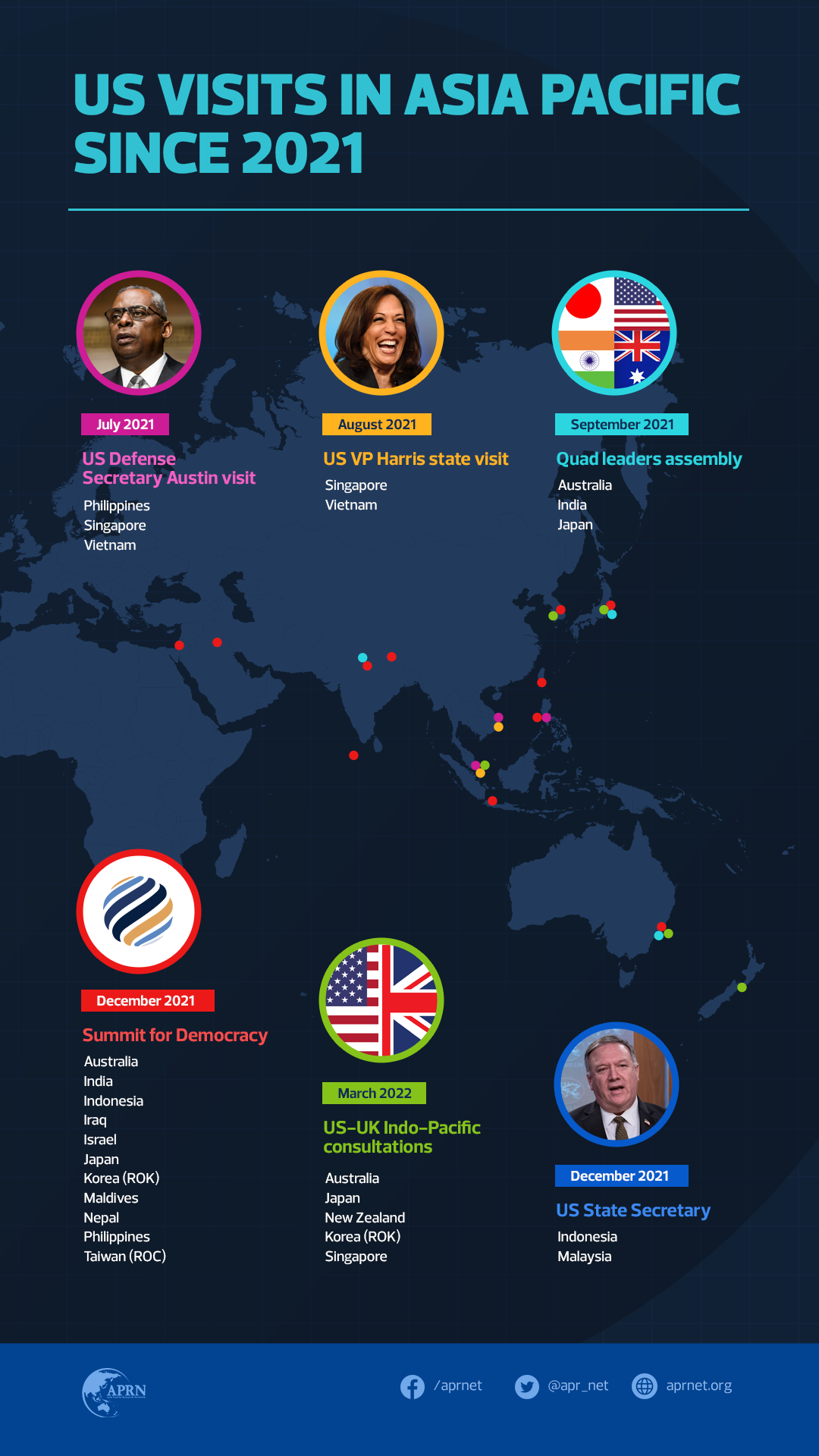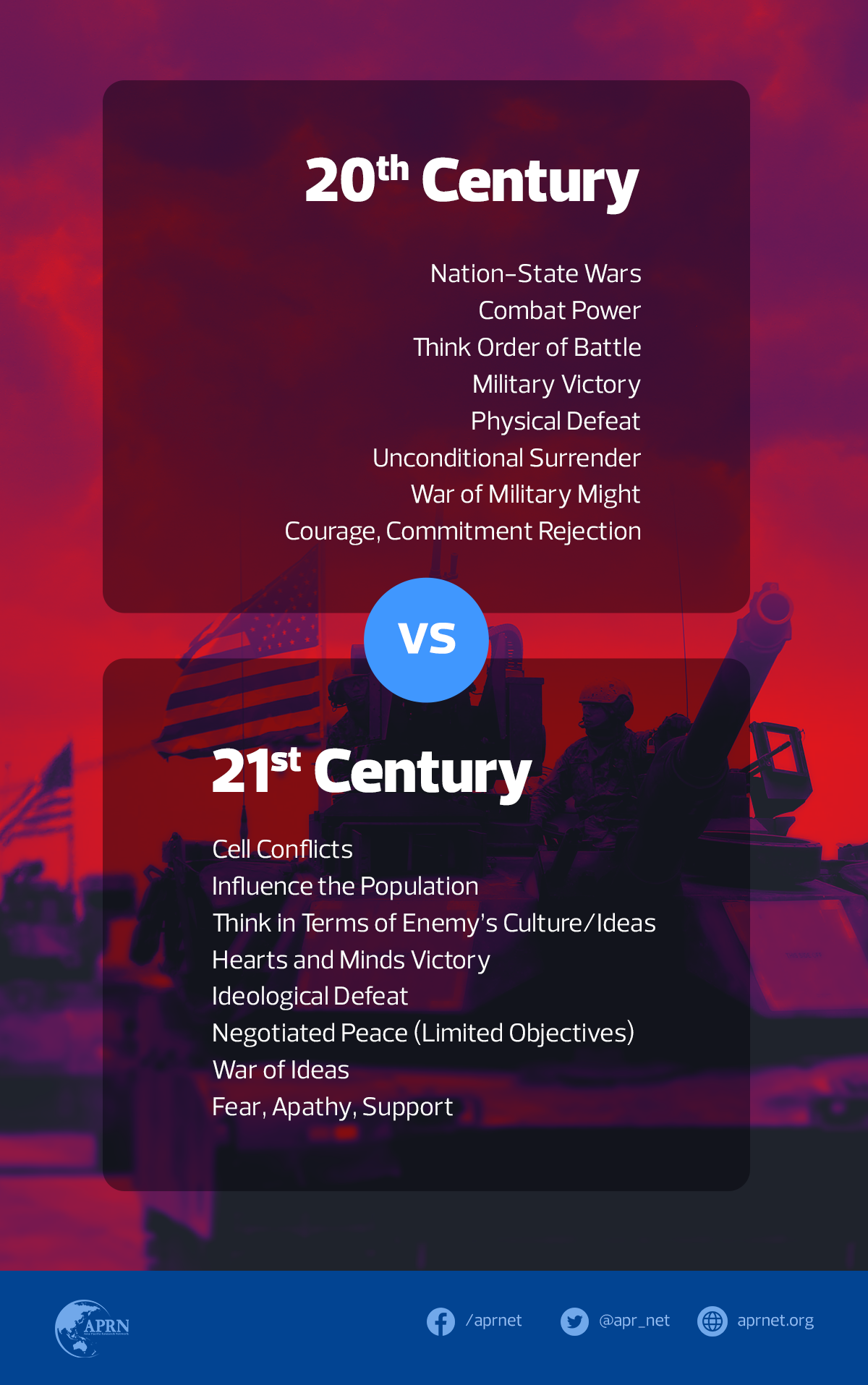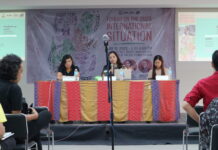It is common knowledge that the United States has unapologetically been involving itself in the affairs of other nations. Their pervasive pursuit tIt is common knowledge that the United States has unapologetically been involving itself in the affairs of other nations. Their pervasive pursuit to secure their national interests has historically proven to be costly for underdeveloped countries. Testament to this are US’ old and new colonies. Now that the Biden administration has effectively withdrawn most of its military presence in Afghanistan, what’s next for the United States and its war machinery?
The answer lies in a foreboding 2011 speech of then US President Barack Obama while addressing the Australian Parliament. “Our enduring interests in the region demand our enduring presence in the region… we are here to stay,” Obama said. He continued with “so let there be no doubt: in the Asia Pacific in the 21st century, the United States of America is all in.” This “pivot to Asia” rhetoric and policy have been more aggressive a decade later under Biden’s governance. The US’ recent state visits confirm their renewed interest to play a bigger role in the Asia Pacific amid their growing Chinese concerns.
The US had a hectic year trying to consolidate their influence in Asia and this trend is believed to continue well into the near future.

This May 2022 highlights how much the US intends to increase their stake in Asia. Last May 12-13, The White House hosted the US-ASEAN Summit in Washington D.C. which aimed to reaffirm their “enduring commitment to Southeast Asia.” This highlights the US’ brazen maneuvers to gain greater access to Asia’s weak domestic markets for their goods, cheap labor, and raw materials to sustain their decaying monopoly capitalism.
Additionally, on the 20th to the 24th of May, Biden visited Asia for the first time. He met with different national leaders to discuss partnerships both new and old. Biden also prompted allied Asia Pacific nations to play a bigger role in stopping Russia. The trip then culminated with a Quad (US, Japan, Australia, and India) meeting which further deepens the precedent for US presence in the region. The establishment of the Quad plus is likely to materialize in the near future.
The Quad engages in different major areas such as health, energy, climate change, counter terrorism, supply chain, and technology. The coalition also voiced in a 2021 joint statement their commitment “to counter threats to both in the Indo-Pacific and beyond.” Although there is no mention of what explicitly qualifies as threats in the eyes of the alliance, US President Biden has made multiple statements condemning China and Russia. In the recent Quad summit, Biden even reaffirmed their commitment to Taiwan that they will intervene should China proceed with military actions against Taiwan – “strategic ambiguity” as he calls it. The Quad is but one of several security pacts in the Asia Pacific organized by the US.
There is the AUKUS trilateral military alliance between the United States, United Kingdom, and Australia which provides the latter with 8 nuclear powered submarines. In addition, AUKUS will further enhance Australia’s cyber capabilities, artificial intelligence, and even quantum technologies. All of which are intended to develop breakthroughs in military technology which will give Australia strategic advantages and more weapons of mass destruction in the event of outright war. An article from The Diplomat argued that AUKUS may be able to help deter China’s military expansion and even reduce the possibility of conflict but “it also ensures that such a conflict would be much more devastating if it did break out.”
Also present in the region is the Five Eyes (FVEY) intelligence alliance composed of the United States, Australia, New Zealand, Canada, and the United Kingdom. The FVEY is a result of decades worth of bilateral deals to exchange surveillance and intelligence among member countries. The lack of domestic legislation on intelligence-sharing allows FVEY to continue their covert monitoring.
Furthermore, the North Atlantic Treaty Organization (NATO) remains a threat to peace and stability given their heinous war crimes and continuous aggression towards any nation the West deems as rivals. Going back to 1991, the US-NATO bombed Yugoslavia into destruction when the latter refused to sign the Rambouilleet agreement. In the context of the Asia Pacific, the writings on the wall for NATO’s belligerency against China’ is outright and alarming. In the reflection process report NATO 2030, China and Russia were identified as one of the primary security concerns for NATO. Since Russia is currently isolated from the international community with its recent aggression, China is likely next.
It is in this growing multipolar configuration that geopolitical tensions are at an all-time high. The vicious competition among rival hegemons generates more flashpoints which directly afflict vulnerable communities. Take into consideration the conflict in Eastern Europe which is the culmination of decades’ worth of US-NATO encroachment and intervention. Ukraine’s Donbas region has been the site of low-intensity wars between US-trained Ukrainian armed forces and pro-Russia separatists. Since the start of the conflict in 2014, a staggering 14,000 casualties and 1.5 million internally displaced people have been reported in Donbas. This bloodshed which precluded Russia’s invasion is a story whose plot is commonplace in all flashpoints. The names, faces, and places are different, but the outcome of these proxy wars is always the same – the suffering of civilians and the subversion of people’s rights
This is why the coupling of diplomacy and warmongering only confirms the desperation of the US. They understand that their decaying influence is further jeopardized by China and Russia’s expansionism. That being said, the United States will be pulling out all the stops to recruit Asia Pacific nation-states into their sphere of influence. Hoping that, in the process, they could usurp their rivals’ control over their bailiwicks.
US intervention might seem to offer a much needed check and balance against unbridled China. However, we must recognize that the US is containing fellow hegemons not for the sake of underdeveloped countries, but to supplant Chinese imperialist aspirations with their own – to become the lone superpower once more.
This ambition is the driving force behind the US’ “Pivot to Asia”. This policy is a rallying call for cooperation among US-friendly nations and tactical allies under the banner of US command. Cooperation is an unmistakable cornerstone of development, but the US brand of cooperation is ironically divisive as it will lead to greater geopolitical tensions. It seeks to consolidate their forces and isolate their competition. At present, the United States continues to seclude and portray China, Russia, and the DPRK in a bad light despite being guilty of the very same allegations.
Isolating enemies through propaganda is as old as war itself. However, a major shift in how conflict and military actions are carried out has taken place post-Cold War. Global superpowers nowadays have preferred subtlety over direct military confrontation. One of the best examples to study is the rebranding efforts of the US military after 9/11. In light of the rapidly changing security landscape, a National Asymmetric Threat strategy meeting was called in 2008. These are some of the comparisons discussed:

The aversion towards all-out war is most apparent in the imperialists’ reliance on proxy wars. By backing opposing sides in local and regional conflicts, they are able to pursue their regional interests minus the direct culpability. Without ever sending boots on foreign soil, they are able to carve out new territories and resources.
Although the imperialist powers orchestrate these proxy wars, our analysis would be incomplete without mentioning the role of their satellite countries. These imperial extensions serve as launch pads, intelligence-gathering hubs, and barracks for troops. In the Asia Pacific, the Republic of Korea, Japan, Australia, Israel, Saudi Arabia, and other nations are home to several US military bases and facilities.
This partnership is not only based on US dependence as sub-imperialist countries such as Australia and Israel also partake. With billions of US dollars flowing into the two countries through security pacts, it is no surprise that they cozy up to the United States.
Under this context, the series of recent US diplomatic meetings lay the groundwork for more military activities in the Asia Pacific. While the Biden administration operationalizes their portent “Pivot to Asia,” cooperating puppet regimes are also complicit.
India’s Prime Minister Modi and Philippines’ outgoing President Duterte, to name a few, are heads of state who are widely criticized for their autocratic leadership. Not only does the United States remain mum on their crimes against the people, but also has been actively supporting their rule. They were even invited to attend the ironically named “Summit for Democracy” last December 2021.
Moreover, Biden phoned new Philippine President Ferdinand Marcos Jr. to congratulate him for his electoral victory. The US President personally offered his support to Marcos despite winning an election marred by deceit, violence, and fraud. Also expressed were the US’ intentions to “continue strengthening the US-Philippine Alliance” on many issues.
The US’ call for cooperation and diplomacy among tyrants must be exposed. It will support even the vilest and most corrupt governments as long as its economic and geopolitical goals are met. This morally bankrupt networking is not exclusive to the US, this practice is shared among hegemons. The United States and other imperialists have indeed changed how conflict is framed, but wars of aggression are still wars of aggression.
Although war has taken up a more tacit characteristic, the people’s resistance remains to be the only answer.

Not only is choosing between US and Chinese hegemony (or both) a false dichotomy but it obscures the fact that there is another option – do away with them altogether. There is a choice wherein people uphold their national sovereignty and patrimony while rejecting foreign interventions.
The dire circumstances require us to collectively exhaust all means to end arms deals, military aid, and joint military exercises. The campaign against the comprehensive expulsion of all foreign military bases, surveillance and data gathering hubs must be strengthened.
Moreover, these imperialist-led military alliances must be opposed. Even without nascent conflict, these alliances consume resources that could have otherwise been spent on public services for the people. These inter-governmental security pacts promote militarism and the culture of impunity and not to mention the massive environmental cost of such agreements. Military alliances, ultimately, ensure widespread destruction of lives and suffering of peoples should war and conflict erupt, affecting even unaligned countries.
Doubts are cast over the binding status of anti-nuclear proliferation agreements with the prospect of an extensive war looming in the near future. The loss and destruction of human life and ecosystems would be incalculable.
This is precisely why we must make a stand. People under puppet regimes must unite with one another and organize themselves. The people, despite being neglected or even terror-tagged in the mainstream narrative, are not passive actors. They have been actively exercising their agency by resisting not just the conflicts, but their root causes as well.
Similarly, all peace-loving members of the international community must make a stand against imperialism and its fascist tools. The rise of wars of aggression, proxy wars, and authoritarian regimes in Asia Pacific. At its current pace, this trend will inevitably reach critical mass, sooner rather than later. It goes without saying that the Asia Pacific’s peace and security situation has already shifted from lukewarm to hot, some even say scalding.
In our effort to end imperialism and all its destructive symptoms, genuine justice must be exacted. The governments of the United States, as well as Russia and China, must be held responsible for their crimes against the people. The same goes for their allied nation-states.
This justice we speak of extends well into diplomatic relations. As representatives of imperialist governments court the Global South, we must oppose these one-sided economic partnerships and precarious military alliances. Biden’s Asia Pacific visit must be met with indignant protests and actions. No bread must be broken. No wine should be shared between the people and their oppressors.
The Asia Pacific Research Network and its member organizations are steadfast in supporting people’s movements’ pursuit to achieve just and lasting peace. A peace based on justice warrants the immediate uprooting of deep-seated hegemony in the region. Hence, we must exhaust all means to break the legs of imperialism – making sure that any “pivot” to take place is one towards their grave!


















